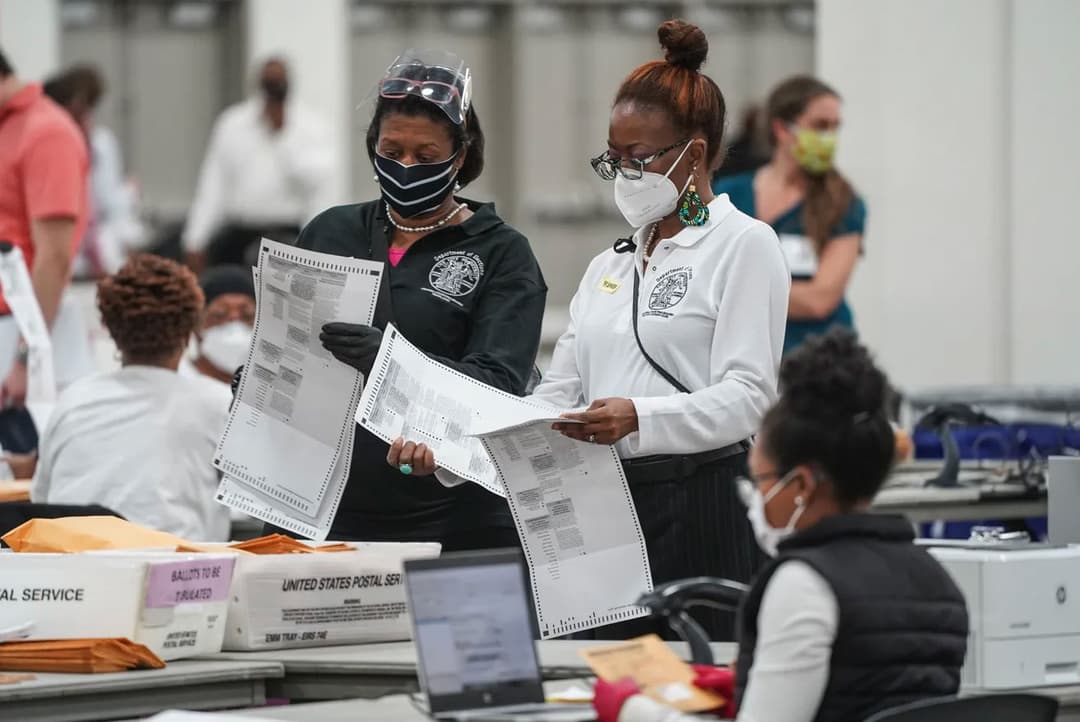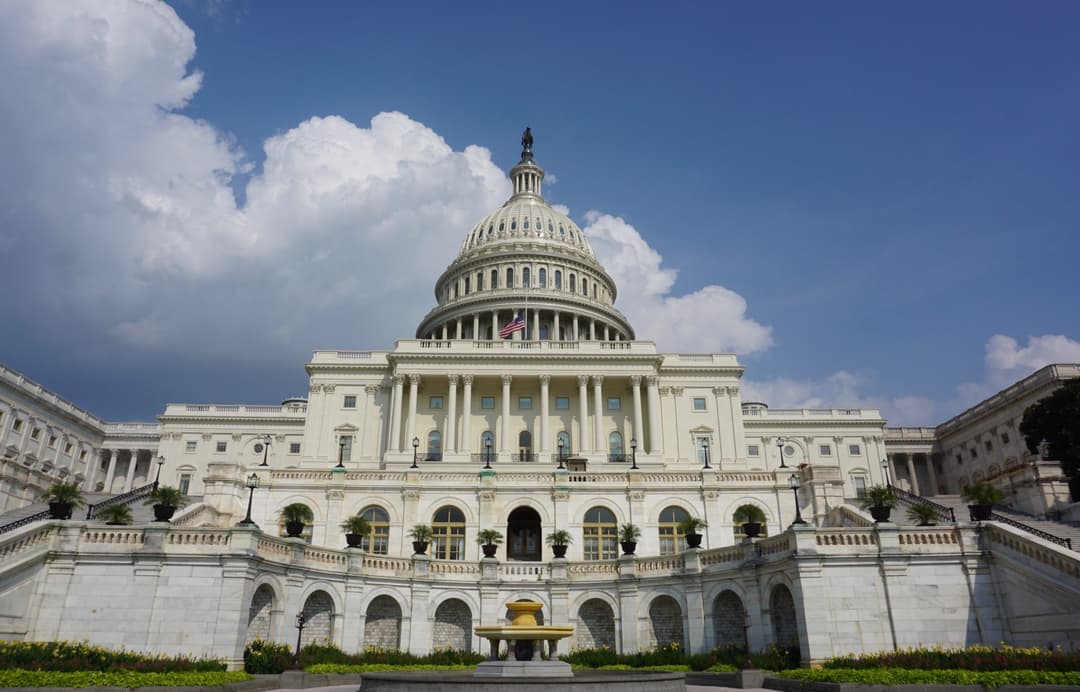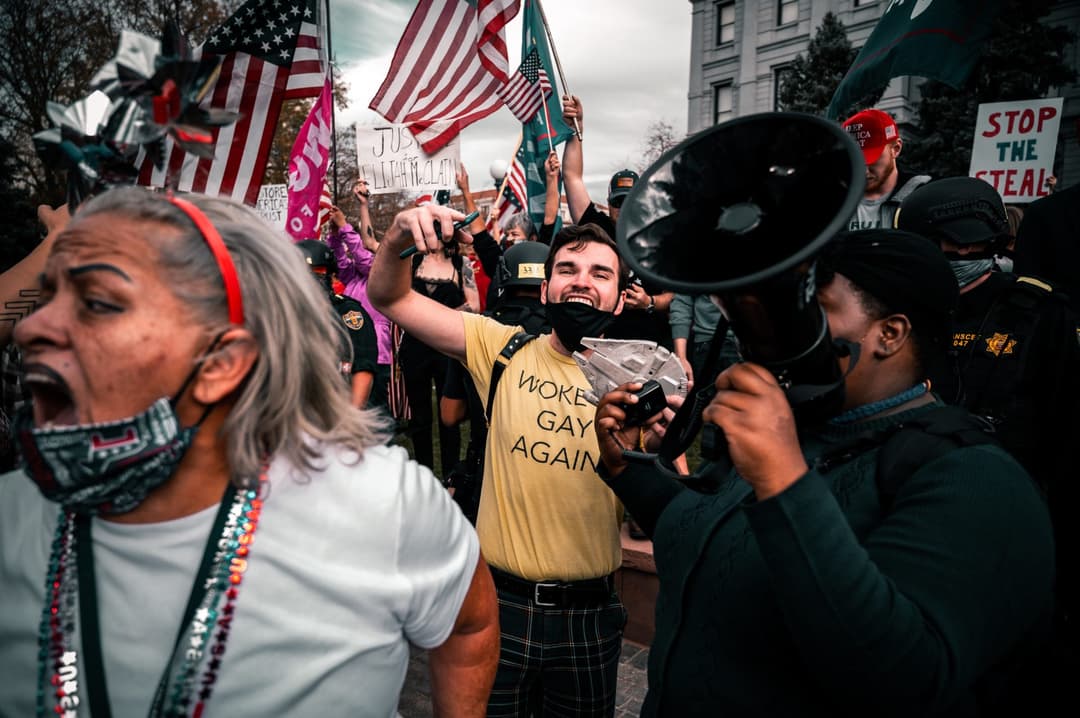Roundtable: Where We’ve Been in 2020
Dec 11, 2020
Managing Editor and anchor, Christy McDonald, sits down with One Detroit contributors Stephen Henderson and Nolan Finley to talk about where we’ve been in 2020 when it comes to politics, the pandemic, and racial injustice and what to look for in 2021.
Read full transcript
Christy McDonald There’s so much to unpack on where we’ve been this year and when we all started out in January of 2020, I don’t think the problems that we’re looking at now were on our radar even then Nolan.
Nolan Finley Oh gosh, who could have imagined something like this? Even though we were starting to see what was happening overseas, I don’t think anybody believed that it would come to the United States with the ferocity it had, plus the other things that that we went through this year. This certainly wasn’t a healthy election season by any measure. And, you know, plus the racial strife that emerged just as the virus was hitting its peak. It was a lot of challenges for the nation.
Christy McDonald Politics, pandemic, racial disparities all really exploding, and now they are all intertwined, really when we talk about how we move forward.
Stephen Henderson Yeah, I mean, we do have to start thinking of these things in terms of how to solve them, how to solve them and how to how to live and how to live together in this country. I mean, it’s hard not to think sometimes that things are just coming apart and coming apart really fast. And part of it is because of the confluence of all of these things. I think any one of these things it would be easier to deal with and to get people to have, you know, to see their common interests in dealing with it. But you put all three of them together, and I think it’s overwhelming for a lot of people and it’s confusing.
Christy McDonald What are you seeing or seeing specifically that people are confused about how they should react to or then reacting in a totally different way? Are you talking about racial disparities, are you talking about people dealing with their kids’ education, are we talking about health?
Stephen Henderson Throw all of that in there and then add on top of that this incredible political divide that we had before, right. It’s not like people were seeing eye to eye before all this happened. But this year, the politics of this year, the reaction to politics of this year and in particular the assault on the election results and on black voters at the end of the year really opened up a chasm that I didn’t predict, you know. I knew it would be an election in which people felt strongly and that, you know, if President Trump lost, he wasn’t going to take it well.
Christy McDonald And this put Michigan’s smack in the middle of this conversation Nolan.
Nolan Finley Yeah, I mean, what happened in Michigan has been a little bit absurd, you know. There’s obviously no evidence of widespread fraud or widespread irregularities in Michigan, it’s a desperation temp. You got a lot of mistrust out there, some of it based on legitimate fears, a lot of it being ginned up by folks with an interest in keeping the process disrupted. But, you know, a lot of people felt the same way for four years ago with this Russian collusion nonsense and the intent to undermine the Trump administration before it went in. Let’s not pretend this is the first time we’ve had an election where people refused to accept impracticality the results. You know, this has been going on well, you know, this time you’ve got a president who is trying to undermine confidence in the election process. Last time you had an administration that used the powers of the government to undermine, undermine its successor. I mean, we’ve got to we’ve got to get back and, in this country, to accepting losses and moving on and working through the process. And we’re not, we’ve got very poor at that.
Christy McDonald Stephen, do you think that’s a fair comparison that Nolan just made, between 2016 and now?
Stephen Henderson It’s an outrageous comparison and it’s part of the problem, right. False equivalence, all right. It is a false equivalence. So, here’s, here’s the difference. The allegations about what happened during the 2016 election were investigated by the Justice Department, by an independent prosecutor. There are 32 convictions that have been achieved in that investigation. People are going to prison because of it. I mean, the idea that there was nothing to that or that it was ginned up is absurd.
Nolan Finley We now have enough investigations and enough reports to know that this was a ginned-up investigation based on false information. And a lot of people forced into making guilty pleas to avoid longer, longer sentences. Based on, based on an investigation, that was not rooted, it was not based in facts.
Christy McDonald Okay Nolan, Stephen.
Stephen Henderson Let me finish with the differences is. You could spend the next 10 years investigating the things that Donald Trump and his friends have said about this election and not find anything. I mean, there is no evidence of what they’re saying. No one would go to jail, no one would plead guilty.
Christy McDonald I want to bring this a little bit more back into where we are in Michigan and looking forward in the time that we have left. What are some of the largest concerns that you see on the horizon, specifically for the city of Detroit in 2021?
Nolan Finley You know, I think our biggest concern in the city of Detroit is whether or not you can repopulate the, all those office buildings, restaurants, bars, when this thing’s finally over. It’s been now, by the time we get to a comfortable place for a broad reopening and people returning to their office, their workplaces, it’s going to be a lot of damage done.
Stephen Henderson I think you can add two things to the problems here in Detroit. One is the effect on the people who live here. I spent a lot of time in Detroit neighborhoods that weren’t benefiting from all of the things that have happened downtown in the first place. And the need, the level of need over the last nine months has just shot through the roof. I mean, people are really, really hurting. We’re going to have real questions about leadership in the city to deal with all of these, all of these problems.
Christy McDonald And I would say leadership in the state as well as we look to a new term of the legislators coming in January, Nolan, who have to tackle a lot of budgetary issues and so much more.
Nolan Finley We’re in a billion-dollar deficit now, it’ll get worse. We don’t have the luxury the federal government has of running a deficit to balance that budget. There’s only two ways to do it. You, well three, you can grow your way out, you can tax your way out, or you could cut spending. And those are, you know, the one you have very little control of, the other two are both very difficult choices.
Christy McDonald And the other thing that is on my mind and looking in 2021 is education. And I’m really worried about how kids either start over, how school districts are dealing with it differently, that you’re going to see even more disparities between districts and learning coming out of this pandemic.
Nolan Finley I’d vaccinate teachers first. We got to get these kids back in school. It’s not just their learning, you got a lot of depression, a lot of anxiety, particularly among teenagers. These kids are suffering, and I would reserve those first vaccines for school teachers.
Stephen Henderson Yeah, I mean, this was a missed opportunity of the year. We do know how to make schools safe. We do know how to make sure that in-person learning was possible. We did not do the things that we needed to do to make sure that that was going to be true in every district. It takes an investment of some resources in some cases, there are real different abilities across different districts in terms of what they were capable of. There was not enough planning and organization across districts to make sure that everybody was on the same page and everybody could do the same things. And so, we started the semester with a hodgepodge of approaches.
Christy McDonald Nolan I think is valuable, that you brought up the mental health aspect of this, of our young people. And I would even say across the board, you know, we have been forever rewired in our brains and how we deal with things and how we deal with crisis. So, I’m going to kind of end on a little bit of a different note here and I want to give each of you an opportunity. If you were in charge of the state of Michigan here starting in January ’21, what would be the three first important points are things that you would put at the top of your agenda?
Nolan Finley Well, reopening the economy. We’ve learned a lot about the virus since the spring, and these restaurants, a lot of them have put in or invested a lot in making their establishments safe and training their workers. I would put I would put that on the top of the list, obviously getting that vaccine out there. And then, you know, I tackle our spending priorities, tackle our budget priorities.
Stephen Henderson Well, my first I think if I were the governor would be that to refocus on school, let’s get schools open. That is something, you know, the CDC is saying we should have all school, we should have all children going to school and not doing virtual learning. We just have to do it safely and we know how to do it. The second, of course, is, is prioritizing vaccinations and then making sure, you know, Mayor Duggan said last week that he’s really concerned about how quickly Detroiters, for instance, will be able to be vaccinated. Again, the gaps that exist in our society are playing out in the pandemic. We’ve got to make sure the. Those gaps don’t matter. I mean, this is life and death. And the third thing is, again, focusing on opening the economy, but doing it safely. We did reopen the economy at the end of the summer and then we had another surge that that required a response. We’ve got to be able to reopen and get enough people to do the things that they’re supposed to do so that the disease does not start hospitalizing people going work at the same level of hospital overruns that we were in the spring. There’s no reason that we need to be that way. You’ve got to figure out how to have a balance.
Christy McDonald Well, there’s a lot to tackle and maybe in 2021 we’ll all sit down within six feet of each other. I’m not sure, you know.
Stephen Henderson Maybe fall, I’m thinking fall 2021.
Christy McDonald Well, we’ll have to see, but we will definitely keep it going. Nolan Finley, Stephen Henderson, it’s great to see both of you. Merry Christmas, Happy New Year, and we will see you in 2021.
Stephen Henderson Yes.
Stay Connected
Subscribe to One Detroit’s YouTube Channel.
Catch the daily conversations on our website, Facebook, Twitter, and Instagram @detroitperforms
Related Posts
Leave a Reply
Your email address will not be published. Required fields are marked*




























